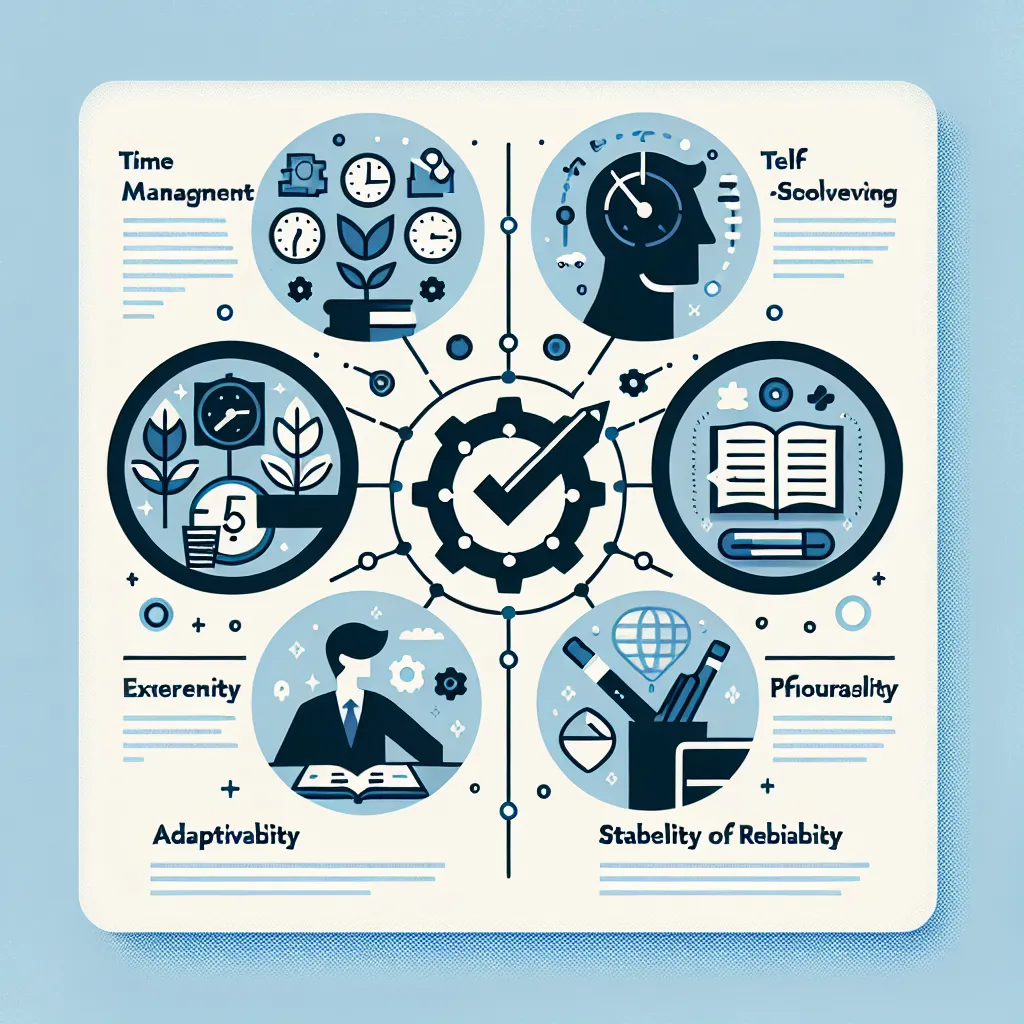In today’s competitive job market, the ability to work independently is a highly valued skill. Many employers seek candidates who can take initiative, manage their time effectively, and produce results with minimal supervision. When interviewing for a position, especially in English, it’s crucial to articulate your independent working skills clearly and convincingly. This guide will help you navigate this aspect of job interviews, providing you with strategies to showcase your ability to work independently in English.
Understanding the Importance of Independent Work
Before diving into how to explain your ability to work independently, it’s essential to understand why this skill is so valuable to employers. In today’s fast-paced work environments, companies need employees who can:
- Take initiative and solve problems without constant guidance
- Manage their time and workload efficiently
- Be self-motivated and proactive
- Adapt to changing circumstances quickly
- Demonstrate reliability and trustworthiness
Employers often assess these qualities during interviews to determine if a candidate will be a good fit for their organization.
 Skills for Independent Work
Skills for Independent Work
Perspectives on Independent Work in Job Interviews
When evaluating a candidate’s ability to work independently, interviewers typically consider several aspects:
Professional Competence
Employers want to ensure that you have the necessary skills and knowledge to perform your job duties without constant supervision. They may assess your technical skills, industry knowledge, and problem-solving abilities.
Communication Skills
Even when working independently, effective communication is crucial. Interviewers will evaluate your ability to articulate ideas, ask for help when needed, and keep others informed of your progress.
Time Management and Organization
The capacity to prioritize tasks, meet deadlines, and manage your workload efficiently is a key indicator of your ability to work independently.
Initiative and Proactivity
Employers value candidates who can identify opportunities, propose solutions, and take action without being prompted.
Adaptability and Resilience
The ability to adjust to new situations, overcome obstacles, and maintain productivity in the face of challenges is essential for independent work.
Sample Interview Questions and Responses
Here are some common interview questions related to independent work, along with sample responses:
-
Q: Can you describe a time when you worked on a project independently?
A: “Certainly. In my previous role as a marketing coordinator, I was tasked with developing a social media campaign for a new product launch. I was given the overall objectives but had to plan and execute the campaign independently. I researched our target audience, created a content calendar, designed graphics, and wrote engaging copy. Throughout the project, I provided regular updates to my manager and sought feedback at key milestones. The campaign resulted in a 30% increase in engagement and significantly contributed to the product’s successful launch.”
-
Q: How do you manage your time when working on multiple tasks?
A: “I use a combination of digital tools and traditional methods to manage my time effectively. First, I prioritize tasks based on urgency and importance. I use project management software to track deadlines and milestones. Each morning, I review my tasks for the day and create a to-do list. I also block out time in my calendar for focused work on high-priority items. This system helps me stay organized, meet deadlines, and ensure that all tasks receive appropriate attention.”
-
Q: How do you stay motivated when working on long-term projects without direct supervision?
A: “I find that setting clear, achievable goals for myself helps maintain my motivation on long-term projects. I break down larger tasks into smaller, manageable steps and celebrate small victories along the way. I also remind myself of the project’s overall importance and how it aligns with my personal and professional growth. Additionally, I maintain regular check-ins with team members or supervisors to share progress and get feedback, which helps me stay accountable and energized.”
-
Q: Can you give an example of a time when you had to solve a problem on your own?
A: “In my role as a customer service representative, I once encountered a complex issue that wasn’t covered in our standard procedures. A high-value client was experiencing a technical problem that was affecting their business operations. Instead of escalating immediately, I took the initiative to research the issue, consulted our knowledge base, and reached out to our technical team for insights. I then developed a step-by-step solution, which I tested before presenting it to the client. This approach not only solved the client’s problem but also led to the creation of a new troubleshooting guide for similar issues in the future.”
-
Q: How do you ensure the quality of your work when working independently?
A: “Ensuring quality is a top priority for me when working independently. I set high standards for myself and implement a personal quality control process. This includes creating detailed project plans with clear deliverables and milestones. I always allow time for review and revision in my schedules. Before submitting any work, I double-check against the project requirements and conduct thorough proofreading or testing, depending on the nature of the task. I also value feedback, so I often seek input from colleagues or mentors when appropriate, which helps me continually improve the quality of my work.”
Tips for Handling Unexpected Questions
Sometimes, you may encounter questions about independent work that you haven’t prepared for. Here are some strategies to handle unexpected questions:
-
Take a moment to think: It’s okay to pause briefly to gather your thoughts. You can say, “That’s an interesting question. Let me think about that for a moment.”
-
Ask for clarification: If you’re unsure about what the interviewer is asking, don’t hesitate to ask for clarification. This shows that you’re attentive and want to provide an accurate response.
-
Draw from related experiences: If you don’t have a direct example, think of a similar situation where you demonstrated relevant skills.
-
Be honest: If you genuinely don’t have experience in a particular area, acknowledge it, but express your willingness to learn and adapt.
-
Focus on transferable skills: Highlight skills from other experiences that could apply to independent work scenarios.
Common Mistakes to Avoid
When discussing your ability to work independently, be aware of these common pitfalls:
-
Overemphasizing independence: While working independently is important, don’t forget to mention your ability to collaborate and work as part of a team when necessary.
-
Lacking specific examples: Avoid giving vague or general answers. Always support your claims with concrete examples from your experience.
-
Neglecting to mention communication: Independent work doesn’t mean working in isolation. Emphasize your ability to keep others informed and seek input when needed.
-
Failing to address potential challenges: Be prepared to discuss how you overcome obstacles when working independently, such as staying motivated or managing distractions.
-
Ignoring the importance of results: When describing your independent work experiences, always highlight the outcomes and how they benefited your employer or team.
Follow-up Interview Questions and Suggested Responses
Here are additional follow-up questions you might encounter, along with suggested responses:
-
Q: How do you prioritize tasks when working independently on multiple projects?
A: “I use a combination of urgency and importance to prioritize tasks. I create a matrix that categorizes tasks into four quadrants: urgent and important, important but not urgent, urgent but not important, and neither urgent nor important. This helps me focus on high-priority items first while ensuring that long-term, important tasks don’t get overlooked.”
-
Q: How do you handle distractions when working independently?
A: “I’ve developed strategies to minimize distractions. I use the Pomodoro Technique, working in focused 25-minute intervals followed by short breaks. I also create a dedicated workspace, use noise-cancelling headphones when necessary, and turn off notifications on my devices during deep work sessions.”
-
Q: Can you describe a situation where you had to make an important decision independently?
A: “In my previous role as a project manager, I once faced a situation where a key supplier suddenly couldn’t deliver crucial components on time. With tight deadlines, I had to decide quickly whether to find a new supplier or adjust our project timeline. After analyzing the costs and risks of each option, I decided to split the order between two alternative suppliers, which allowed us to stay on schedule without compromising quality.”
-
Q: How do you ensure you’re aligned with team goals when working independently?
A: “I make it a priority to stay connected with my team and understand our collective objectives. I regularly participate in team meetings, review project documentation, and maintain open lines of communication with my manager and colleagues. I also make sure to link my individual tasks to broader team and organizational goals, which helps me stay focused and aligned.”
-
Q: How do you handle feedback on your independent work?
A: “I view feedback as a valuable opportunity for growth and improvement. When I receive feedback, I listen actively, ask clarifying questions if needed, and take notes. I then reflect on the feedback and create an action plan to implement necessary changes. I also follow up with the person who provided the feedback to ensure I’ve addressed their concerns adequately.”
By preparing thoughtful responses to these questions and following the guidelines provided, you’ll be well-equipped to effectively explain your ability to work independently in English during job interviews. Remember to practice your responses out loud and, if possible, with a friend or mentor who can provide feedback. Good luck with your interview!
For more tips on acing your job interview in English, check out our guide on how to talk about your initiative in an interview.




